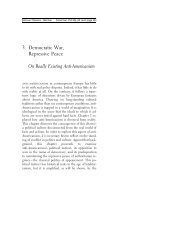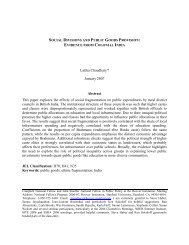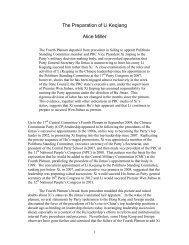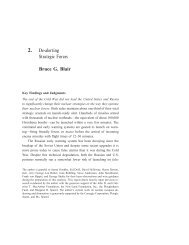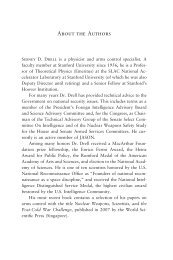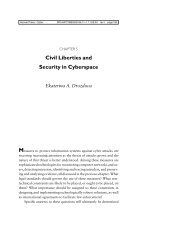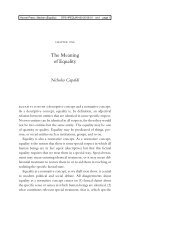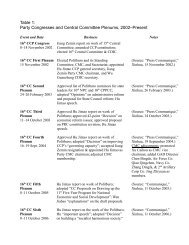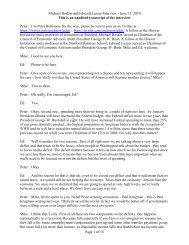A New Clandestine Service: The Case for ... - Hoover Institution
A New Clandestine Service: The Case for ... - Hoover Institution
A New Clandestine Service: The Case for ... - Hoover Institution
Create successful ePaper yourself
Turn your PDF publications into a flip-book with our unique Google optimized e-Paper software.
<strong>Hoover</strong> Press : Berkowitz/Intelligence hberai ch4 Mp_123_rev1_page 123<br />
A <strong>New</strong> <strong>Clandestine</strong> <strong>Service</strong><br />
123<br />
of yesteryear. <strong>The</strong>y could not af<strong>for</strong>d to work exclusively the SE target,<br />
either behind the Iron Curtain as denied-area officers servicing<br />
“dead-drops” and occasionally meetings agents or in the other area<br />
divisions trying to meet Soviet and East Europeans at cocktail parties,<br />
sporting events, and expatriate British pubs.<br />
In other words, the Islamic terrorist target has become <strong>for</strong> the<br />
<strong>Clandestine</strong> <strong>Service</strong> what the Soviets were during the Cold War: the<br />
seldom met, let alone recruited, enemy who justifies a global service<br />
vastly too large <strong>for</strong> it to be honest and effective. <strong>The</strong> myth of recruiting<br />
Soviet and hard-core East European and Cuban targets sustained<br />
the institution’s esprit de corps and made it easier <strong>for</strong> case<br />
officers to deceive themselves about their espionage profession. 7<br />
<strong>The</strong> myth of recruiting counterterrorist agents against al Qaeda and<br />
other militant Islamic organizations is now developing. <strong>The</strong> success<br />
7. For an amusing description of how the CIA has changed its focus to terrorism,<br />
see Lindsay Moran’s commentary on CIA case officer training in Blowing<br />
My Cover: My Life as a CIA Spy and Other Misadventures (Putnam Adult, 2004).<br />
Confronting totalitarian security services is out at “the Farm,” the agency’s training<br />
facility in rural Virginia; terrorists are in. <strong>The</strong>re is nothing in theory wrong<br />
with this. However, what is notable about Ms. Moran’s junior-officer experience<br />
is the continuing mediocrity of the espionage training: the laughter-provoking<br />
badness of the spy instructors and the Farm’s management. Al Qaeda has<br />
replaced the KGB; otherwise, plus ça change, plus ça reste le même. What good<br />
junior officers have discovered when they leave the Farm is that case officers at<br />
headquarters and overseas aren’t necessarily better than the professional “failures”<br />
they had as instructors. <strong>The</strong> Farm is the first important step in the conditioning<br />
of officers to accept the operational surreality of the whole institution. Ms.<br />
Moran is also a good read about the frustration and uselessness that many case<br />
officers—the thoughtful ones—feel when they look at the mediocre <strong>for</strong>eign-intelligence<br />
agents they recruit and run. Ms. Moran was overwhelmed with this malaise<br />
post-9/11, given the pettiness of what she was doing and the urgency and<br />
seriousness of the threat against the United States (see, in particular, Moran, pp.<br />
270–288). Feeling frustrated and useless has always been a common theme<br />
among educated case officers who take their jobs seriously. <strong>The</strong> sensation is<br />
dulled somewhat when case officers have fun in their work—when operatives,<br />
particularly male operatives, are enjoying themselves and occasionally feeling the<br />
adrenaline surge, they tend to believe that the work they’re doing is serious and<br />
important to the nation.



